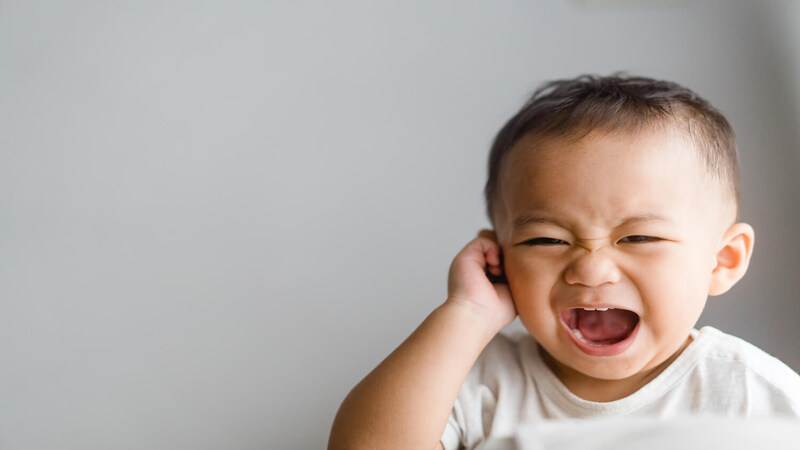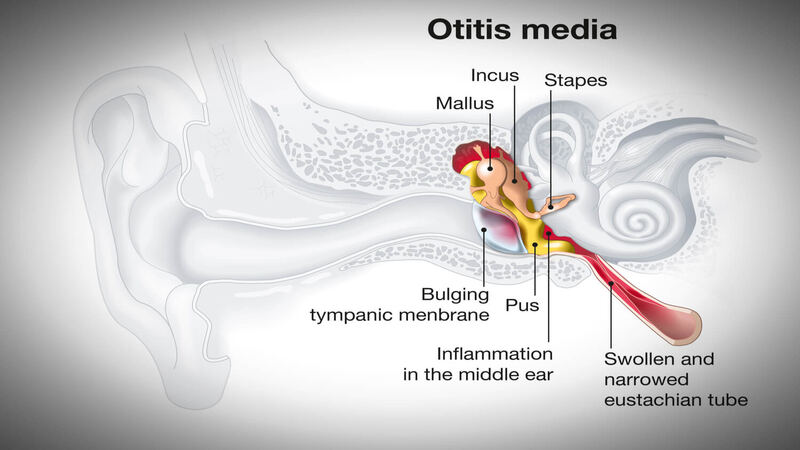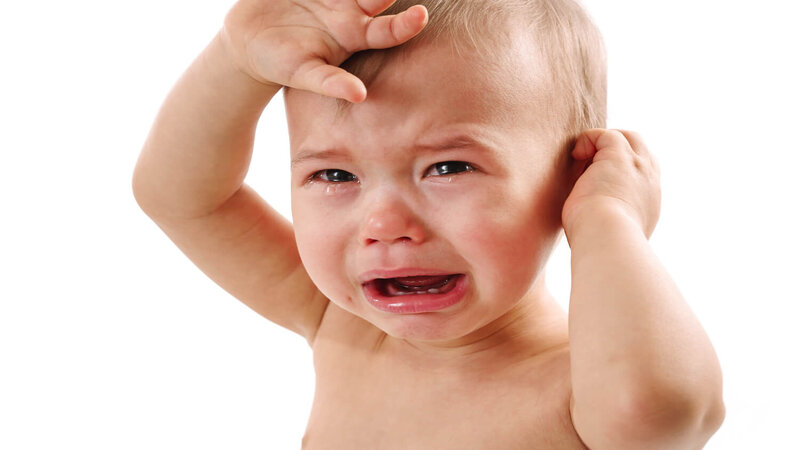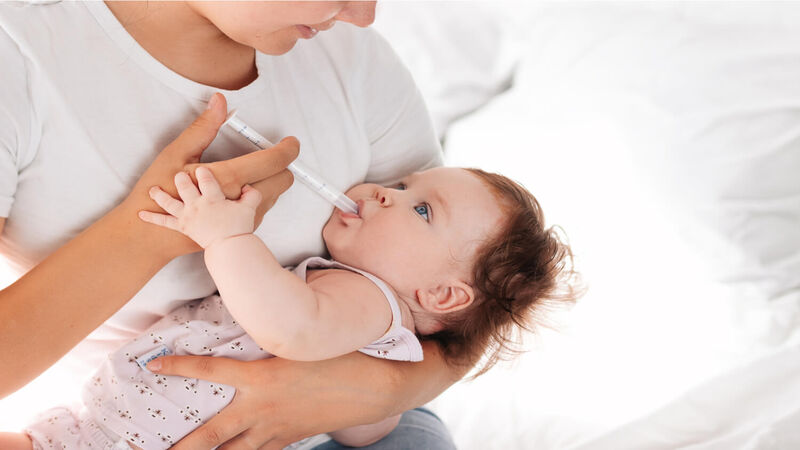
Your child has a cold, and you notice that he/she is unusually fussy, cranky, and irritable. It might just be the side effects of the cold, or he/she might be getting an ear infection. Ear infections are painful, especially in babies as they cannot tell you that their ears hurt.
Ear infections in babies are quite common, with 5 out of every 6 babies getting it before they celebrate their 3rd birthday. So, it is important to catch the symptoms early on, identify the infection, and help your baby deal with the pain and recover.
What Is An Ear Infection?
Medically referred to as Otitis media, an ear infection is said to occur when the middle ear gets painfully inflamed. Most of these ear infections occur in the Eustachian tube, which gets swollen, and one can notice inflammation. This tube also connects the nose, ears, and throat and the fluid that builds behind the eardrums causes pressure and pain. Ear infections generally occur after a cold, so bacteria and viruses can be blamed.
What Causes Ear Infection In Babies?
Ear infections are usually caused by a bacterial or viral infection that occurs behind your child’s eardrum. Now in usual cases, when fluids enter the area behind the eardrum, it is quickly drained out through the eustachian tube. The eustachian tube is a narrow passage that connects the middle ear to the pharynx (back of the nose and throat).
However, if your baby has a cold or a sinus infection, then the eustachian tube might be blocked, causing the fluid to build up behind the ear drum, making it a perfect ground for infections! Your little baby’s ear becomes the breeding place for germs – owing to the area being warm, moist, and dark. As the infection spreads, it causes the area to be inflamed, leading to distress and pain in babies.
Signs And Symptoms Of Ear Infection In Babies

Ear infection in babies is quite common, especially under the age of 1 year. A change in your baby’s mood is perhaps the first indication that something is wrong with your baby, and hence it should never be taken lightly. Some of the ways you can tell if your child has an ear infection are:
- Your baby develops a fever.
- The baby is tugging at his/her ear, and it is evident he/she is in pain (they might tug at the ear without reason too).
- They might develop gastrointestinal tract infections which can result in vomiting and diarrhea.
- They might also find it difficult to swallow/chew, which will present itself as a reduced appetite. The baby might pull away from the breast or a bottle
- If you suspect an ear infection, you can smell your baby’s ears – infections usually lead to an unpleasant smell. There might even be some yellowish or whitish discharge from the ear
- Your child might be having difficulty sleeping, as lying down makes it more painful.
What Are The Types Of Ear Infection?
Ear infections typically fall under one of three categories. Each has a unique constellation of symptoms.
Acute Otitis Media (AOM)

Acute otitis media (AOM) is an infection of the middle ear. After upper-respiratory infections, this is the second most common diagnosis given to infants who have been brought to the emergency room. In spite of the fact that acute otitis media can occur at any age, it is most common in babies between the ages of six and 24 months.
Portions of the middle ear get infected and swell up. The fluid is, thus, trapped behind the eardrum. This causes earaches in babies. Your infant might also have a fever.
Otitis Media With Effusion (OME)
Otitis media with effusion (OME) refers to the accumulation of noninfectious fluid in the middle ear. Occasionally, this occurs when fluid remains trapped behind the eardrum after an ear infection. A baby with OME may exhibit no symptoms, but a doctor can detect fluid behind the eardrum by using a specialized instrument.
Chronic Otitis Media With Effusion (COME)
In this instance, the fluid remains in the middle ear for an extended period of time. Or it accumulates continuously even though there is no infection. The tympanic membrane is subjected to pressure as a result of the accumulation of fluid in the middle ear and the Eustachian tube. Due to the fact that the pressure prevents the tympanic membrane from vibrating as it should, there is a reduction in sound conduction, and as a consequence, the baby’s hearing is impaired.
How Long Do Ear Infections Last In Babies?

After a visit to the pediatrician, your baby should start feeling better within a few days at the most. Please contact your child’s pediatrician if it has been several days since the onset of symptoms and your child still appears to be ill. There’s a chance that a different antibiotic will be necessary for your child. Even after the infection has been cleared up, fluid may still be present in the middle ear; however, it should go away within three to six weeks, on average.
Why Are Babies Prone To Ear Infections?
Children are more prone to ear infections than adults because their eustachian tubes are shorter, just (about 1/2 inch in length) and horizontal. Adults have vertical eustachian tubes about three times larger than babies and are also more vertical thus enabling quicker draining of any fluids that get in the ears.
How Can Ear Infection In Babies Diagnose?
If you notice any sign of infection, it is advisable you take your baby to the doctor right away. The doctor will use an otoscope to look inside the baby’s ear to detect an infection. If he sees a red, swollen eardrum, it’s a sign of infection. To confirm the diagnosis, he might use a pneumatic otoscope, which causes eardrum movement in an uninfected ear. If he sees that the eardrum does not move in response to this device, then he will confirm that your baby has an ear infection.
Treatment For Ear Infection in Babies

Most ear infections go off on their own. But depending on the severity of the infection, your child’s doctor might prescribe painkillers or antibiotics. However, waiting for 48-72 hours before prescribing antibiotics is recommended. Antibiotics may also cause the baby to develop diarrhea and vomiting, hence should be only administered if medically suggested. There are also multiple home remedies that you can try if you do not want to follow allopathic medicine.
- Painkillers for ear infections: If the infection is minor, but causing considerable distress in your baby, then the doctor might prescribe a pain killer like ibuprofen to relieve pain, provided your child is at least 6 months of age.
- Antibiotics for ear infections: Doctors are more careful about prescribing antibiotics to babies as it increases the risk of them developing antibiotic-resistant infections. However, if the infection is severe, or if he/she is getting repeatedly infected, then the doctor might prescribe antibiotics (like Amoxicillin), which you need to ensure your child takes for the full course.
- Home remedies for ear infections: There are many things you can do at home to relieve the pain of the infection and even cure it. Some of these are
- Giving your baby a moist warm compress on the infected ear.
- Placing boiled garlic on the ear (not inside the canal) and securing it in place with a ball of cotton wool and duct tape. Garlic can draw out the infection.
- Breastfeeding your child.
- Giving your baby steam with lavender and eucalyptus oil.
How To Prevent Ear Infections In A Baby?

Although mostly it is inconvenient and painful, but not harmful, ear infections can sometimes be very serious, especially when it leads to eardrum rupture. In fact, repeated ear infections can cause permanent scarring in the inner ear and result in hearing loss. Prevention is any day better than cure! So, it is good to know a few tips that can help in preventing ear infections:
- Since it is a cold/sinus infection that leads to ear infections, one of the best ways to prevent it is to prevent your child from catching a cold! Keep him/her away from infected people. Wash your child’s hands (and feet if he/she sucks on them!) often and have all the adults around your baby use a hand sanitizer religiously.
- Vaccines can prevent many diseases that will lead to ear infections. So, keeping your baby’s vaccinations up to date is another great way to prevent ear infections.
- Some of the vaccines that are helpful are the Hib vaccine, flu vaccine, and pneumococcal vaccine.
- Children who are breastfed until 6 months are more immune to catching infections. So, breastfeeding your child is another way to prevent ear infections.
- Research indicates that if babies are exposed to cigarette smoke, then they are more likely to catch ear infections that lead to hearing loss. So, keeping your baby away from cigarette smoke is essential, not just to prevent ear infections, but also for overall health.
When To Call The Doctor For Baby’s Ear Infection?
It is strongly advised that you take your child to the pediatrician if any of the following symptoms are present in your child.
- Fever greater than or equal to 100.4°F (38°C) in infants younger than 3 months, or 102.2°F (39°C) in infants older than 3 months.
- Blood or pus coming out of the ears.
- The earache is excruciating and has not subsided two hours after taking the ibuprofen.
- It’s also important to return to the doctor if your baby has been diagnosed with an ear infection and the symptoms don’t go away within three to four days.
- A crooked smile results from facial asymmetry due to weakness on one side, which indicates a serious underlying issue.
Ear infection in babies is common. In fact, most babies will catch this at least once before their third birthday. Timely medical intervention and following the doctor’s advice properly will help reduce the risk of the infection getting aggravated and other side effects.
FAQs
1. Can A Baby Have An Ear Infection Without A Fever?
It has been found that an ear infection will cause a fever in fifty per cent of babies. This means that another 50% of babies may contract ear infections without fever.
2. What Are The Risk Factors For An Ear Infection?
Even though most ear infections do not result in long-term complications, recurrent infections can cause the following side effects.
- Infections of the ear canal can cause temporary hearing loss in babies (muffling and distortion).
- Speech and language development can be delayed if a child’s hearing is impaired.
- An eardrum tear can result from pressure caused by a prolonged presence of fluid in the middle ear. Approximately 5 to 10 per cent of babies with ear infections develop a small tear in their eardrums.
3. What Happens If A Baby’s Ear Infection Goes Untreated?
It is possible for an infection to spread beyond the ear if it does not resolve on its own, if it is left untreated, or if treatment is incomplete. Infection can cause damage to the nearby mastoid bone, which is the bone that is located behind the ear. Meningitis is caused when an infection travels to the membranes that cover the brain and spinal cord (meninges) and spreads there. This happens very rarely.

